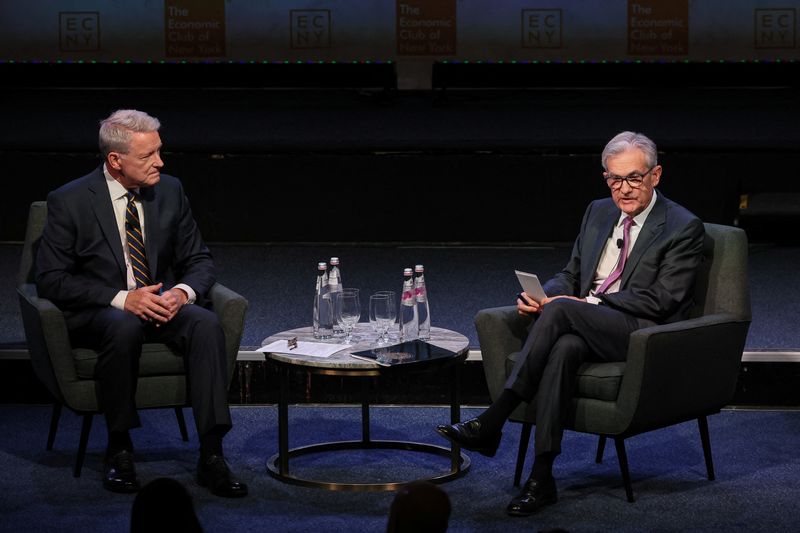Select Language

By Howard Schneider
WASHINGTON (Reuters) -U.S. Federal Reserve Chair Jerome Powell, avoiding disputes over fiscal policy, energy, housing, Ukraine and other tangled issues, told U.S. lawmakers on Wednesday he and his colleagues would “keep our heads down” in a charged presidential election year, with interest rate cuts still likely in coming months but only if warranted by further evidence of falling inflation.
Rate cuts "really will depend on the path of the economy. Our focus is on maximum employment and price stability, and the incoming data as they affect the outlook, and those are the things we'll be looking at," Powell told the House Financial Services Committee. "We are just going to keep our heads down and do our jobs and try to deliver what the public is expecting from us."
Powell in his prepared remarks to the House panel said rate reductions will "likely be appropriate" later this year, "if the economy evolves broadly as expected" and once officials gain more confidence in inflation's steady decline.
Though nothing is guaranteed and progress on inflation "is not assured," Powell said, he regarded the economy as clear of immediate recession risks, with a low 3.7% unemployment rate and broad growth likely to continue, and an expectation that inflation will remain in decline.
"That's the economy that we're trying to achieve. We're on a good path so far to be able to get there," Powell said.
But the coming decision of when and how far to reduce the benchmark interest rate is both complex in an economy that is showing signs of continued disinflation but also unexpected strength, and consequential in the upcoming rematch between incumbent President Joe Biden, a Democrat, and Republican former President Donald Trump.
"We're in a political year," Patrick McHenry, a North Carolina Republican and the committee's chairman, said as he opened the hearing by quizzing Powell on the central bank's rate cut plans and noting that everything the Fed does would be seen through the "lens" of the November presidential vote.
Investors currently expect an initial rate reduction in June; Fed officials as of December projected three quarter-point cuts over the course of the year, and will update that outlook at a meeting in two weeks.
Though Fed officials like to say it makes little difference to the economy if they delay any decisions from one meeting to the next, Powell reiterated that the Fed does see competing risks ahead - on the one hand of failing to cut rates soon enough and doing unnecessary damage to the economy, on the other of easing credit conditions too soon and reinvigorating inflation.
For Biden, the outcome of the Fed's debates could influence whether his approval ratings and perceived management of the economy remain low, or whether he heads into the heart of the campaign with low inflation, a low unemployment rate, and falling interest rates.
Further rate hikes, at least, appear to be off the table, with Powell repeating that the current benchmark rate, held in the 5.25% to 5.5% range since July, was "likely at its peak."
"The bar for additional tightening is relatively high," said Nationwide Senior Economist Oren Klachkin, "Only a string of stronger-than-expected economic reports, mainly on the inflation and jobs front, would convince policymakers that tighter policy is warranted."
But an array of asset values have been climbing, overall financial conditions have been growing easier despite the Fed's restrictive policy stance, and some of Powell's colleagues have been talking of "exuberance" in the economy that could again rekindle price pressures.
SOLID OUTLOOK
The central bank's latest Beige Book compendium of anecdotal evidence about the economy offered an apparent upgrade to the already solid outlook, with 11 of 12 Fed regions reporting steady or increased economic activity.
For Powell and his colleagues, that has seemed to leave the bias in favor of delaying any rate cut, particularly as long as the economy remains strong.
The House session, which the Republican majority in particular used to focus on bank regulation, will be followed with a Thursday hearing before the Senate Banking committee.
For the inflation-weary constituents of lawmakers conducting this week's hearings, a high Fed policy rate means elevated interest rates for home mortgages, credit cards and small business loans, which arguably have contributed to Biden's current low approval ratings, even as that tough monetary medicine helps relieve high inflation.
Recent data has done little to clarify what may happen next. Reports bolstering the "soft-landing" narrative, such as encouraging figures on services prices on Tuesday or signs of slowing consumer spending, have been counterbalanced by others showing inflation stuck in significant ways, such as from still-rising shelter costs, or evidence of unexpected economic strength, such as January's outsized gain of more than 350,000 jobs.
But Powell remained optimistic, saying that the elements of a "soft-landing" were still taking shape even though he would not label it as such.
"We expect inflation to come down, the economy to keep growing," Powell said. "If that's the case, it will be appropriate for interest rates to come down significantly over the coming years."

